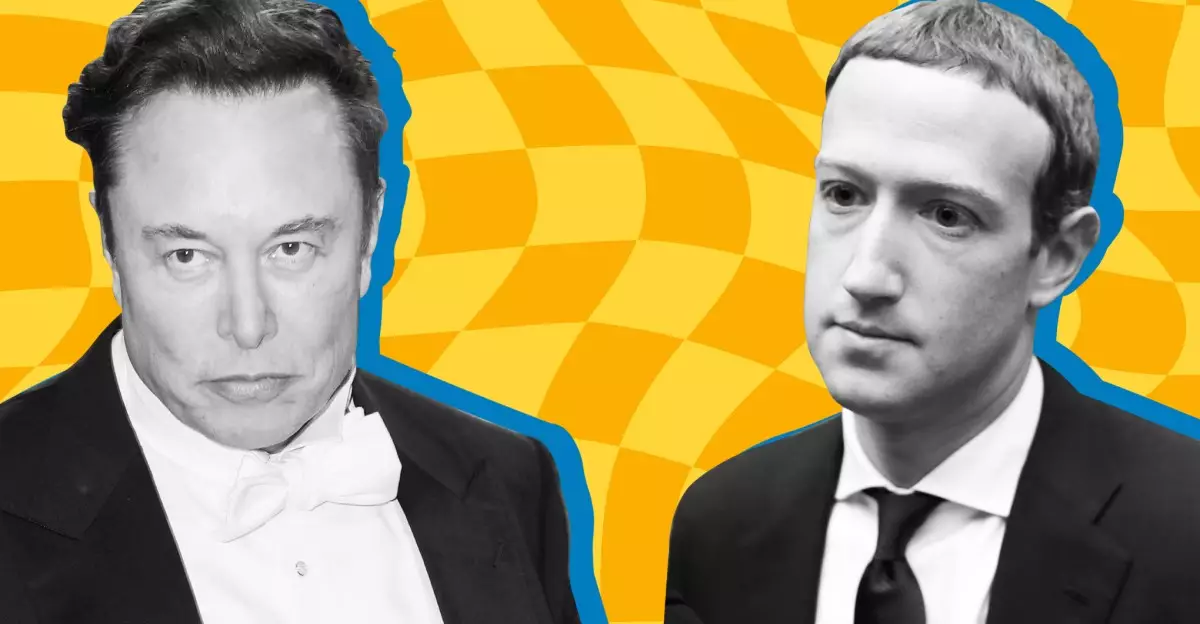In an unprecedented act of digital mischief, the bustling streets of California have become a stage for satirical performances by AI-cloned voices of some of the tech industry’s most recognizable figures: Elon Musk and Mark Zuckerberg. This peculiar phenomenon, which began last weekend, has transformed mundane crosswalk signals into comedic snippets, poking fun at the very essence of their personas. With the rising concerns around AI and its implications, this glitch raises important questions about the boundaries of technology, satire, and personal branding.
The cacophony of Musk’s and Zuckerberg’s voices issuing from crosswalk buttons in cities like Palo Alto, Redwood City, and Menlo Park provided an uncanny blend of humor and discomfort. Imagine waiting at a busy intersection only to hear a familiar voice quipping about social media’s impact on society or the metaphorical struggles of being a tech mogul. It’s an absurd twist that not only disrupts the typical pedestrian experience but illustrates a broader issue of identity and representation in today’s hyper-digital landscape.
The Intersection of Humor and Critique
The content of these AI-generated messages is equally as striking as their source. Musk, known for his brash demeanor and outlandish rhetoric, greets pedestrians with remarks about loneliness, the nature of wealth, and an appeal for friendship. In contrast, Zuckerberg’s voice delivers scathing commentary on the influence of technology and social media on democracy and individual agency. The selection of lines—drawing attention to topics like the commodification of happiness and societal manipulation—reflects ongoing critical dialogues about these figures and their legacies.
This deliberate use of humor transcends mere jest; it turns an ordinary moment into a cultural commentary. By using the voices of these CEOs, the prankster taps into the public’s existing narratives about them—Musk’s detached brilliance and Zuckerberg’s contentious relationship with privacy and security. These moments serve as a critical mirror, reflecting the public’s discontent while also providing a momentary escape through laughter.
The Responsible Use of Technology
While the outrageous nature of these AI-generated voices may elicit laughter, it also raises significant ethical questions about technology and responsibility. The primary function of crosswalk signals is to guide and protect vulnerable pedestrians. The hacking of these systems not only undermines their utility but also emphasizes an unsettling reality: as technology advances, the potential for misuse escalates.
The responses from city authorities indicate a recognition of the problem. Palo Alto officials suspended the voice function of affected crosswalk signals, emphasizing a commitment to safety amidst the chaos of digital pranks. However, the fact that such an event took place highlights the vulnerabilities ingrained in technology. The act serves as a reminder that we must remain vigilant as society integrates AI into everyday life, ensuring that it remains an ally rather than a chaotic disruptor.
The Laughter Behind the Mask
As the digital age progresses, the barrier between reality and simulation becomes increasingly blurred. Elon Musk and Mark Zuckerberg, with their vast influence, represent both the possibility and peril of this transformation. The mockery that emerges from their AI-cloned voices encapsulates public sentiment—an amalgamation of both admiration and criticism.
The blend of humor, fear, and critique showcased through these AI voices speaks volumes about our relationship with technology. It compels us to confront our feelings about tech leaders who have shaped our social landscapes. Are we simply amused, or do we believe their actions deserve scrutiny, and now, perhaps even derision? The choice to exploit their voices in this manner can be considered a form of digital resistance—a rejection of their often unchallenged status.
What’s Next After the Laughter?
As amusing as this incident may be, it opens the door to critical conversations about the future of AI and its implications. What happens when the lines between an individual’s voice and persona can be so effortlessly replicated? As we navigate this uncharted territory, it is pertinent to consider the potential repercussions of such technology moving forward.
While we may chuckle at the satire, the real question remains—is the act of cloning a voice a harmless joke, or does it signify a deeper societal unease with the very fabric of identity and representation? In a world where our lives are increasingly documented and manipulated through technology, the implications of such acts extend beyond humor, urging us to question the relationship we hold with these tech figures and the realities they promote.

